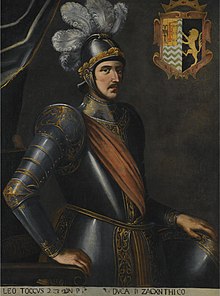Our website is made possible by displaying online advertisements to our visitors.
Please consider supporting us by disabling your ad blocker.
Leonardo III Tocco
| Leonardo III Tocco | |
|---|---|
 | |
| Despot of Epirus Count Palatine of Cephalonia and Zakynthos | |
| Reign | 30 September 1448 – September 1479 (claimed in exile until c. 1503) |
| Predecessor | Carlo II Tocco |
| Successor | Carlo III Tocco (titular) |
| Born | After 1436[1][a] |
| Died | Before August 1503[1][a] Rome |
| Spouse | Milica Branković Francesca Marzano |
| Issue more... | Carlo III Tocco |
| Dynasty | Tocco |
| Father | Carlo II Tocco |
| Mother | Raimondina Ventimiglia |
Leonardo III Tocco (after 1436 – before August 1503)[a] was the last ruler of the Despotate of Epirus, ruling from the death of his father Carlo II Tocco in 1448 to the despotate's fall to the Ottoman Empire in 1479. Leonardo was one of the last independent Latin rulers in Greece and the last to hold territories on the Greek mainland. After the fall of his realm, Leonardo fled to Italy and became a landowner and diplomat. He continued to claim his titles in exile until his death.
Leonardo inherited numerous possessions on the western Greek mainland from his father. Most of these mainland territories, including the capital of Arta, were conquered by the Ottomans in 1449, the first year of Leonardo's reign. Leonardo had inherited the throne while still underage and his government was initially headed by a four-person regency council for several years. Upon becoming old enough to rule for himself, Leonardo had all of his former regents murdered. Leonardo engaged in several anti-Ottoman activities, such as working on the side of the Republic of Venice in the First Ottoman–Venetian War (1463–1479). Despite this, his realm was left in peace throughout most of his reign and became one of the most prosperous regions in Greece.
Although energetic and wise, Leonardo was not very successful. He engaged in several efforts to gain the support of the many Greeks who lived under his rule, such as restoring Greek Orthodox religious sees, allowing Greeks a certain degree of autonomous self-governance, and issuing Greek-language charters. These efforts do not appear to have had an effect on most of the populace. In 1477, Leonardo married a Neapolitan noblewoman in an attempt to gain support from the Kingdom of Naples. This move backfired catastrophically; the Republic of Venice, which acted as Leonardo's main protection against the Ottomans, opposed Neapolitan influence in Greece and ceased to support Leonardo. The end of Venetian protection paved the way for the 1479 Ottoman invasion that ended Leonardo's rule.
Viewing opposition to the Ottomans as futile, Leonardo escaped into exile. Although he spent the rest of his life pondering ways to regain his lands, Leonardo never returned to Greece. In Italy, he attempted to increase his status by acquiring various fiefs. This was an unsuccessful venture that resulted in Leonardo ending up in considerable debt and losing all the lands he had acquired. Leonardo died in Rome at some point in the pontificate of Pope Alexander VI (r. 1492–1503), crushed as his house collapsed on top of him. Leonardo's titular claims were inherited by his eldest son, Carlo III Tocco.
- ^ a b c Shamà 2013, p. 31.
- ^ Miller 1921, p. 513.
- ^ Miller 1908, p. 488.
Cite error: There are <ref group=lower-alpha> tags or {{efn}} templates on this page, but the references will not show without a {{reflist|group=lower-alpha}} template or {{notelist}} template (see the help page).
Previous Page Next Page


